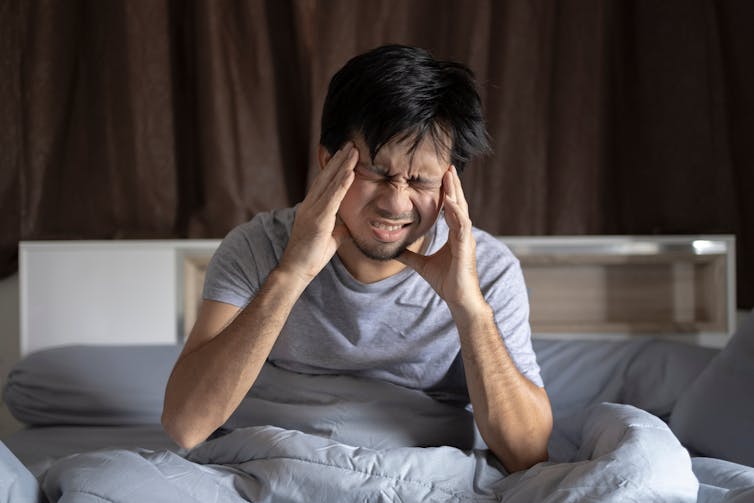Here's what happens when you’re hospitalised with COVID
- Written by Julian Elliott, Executive Director, National COVID-19 Clinical Evidence Taskforce, and Professor, School of Public Health and Preventive Medicine, Monash University

The number of people infected with COVID-19 and requiring treatment in hospital is rapidly increasing.
Vaccination provides very effective protection against severe COVID but at current levels of vaccination, outbreaks are still likely to result in large numbers of people requiring treatment in hospital.
Thankfully, there are reliable evidence-based guidelines on how to best treat COVID. Here’s what they recommend.
Read more: We're two frontline COVID doctors. Here's what we see as case numbers rise
What happens when I test positive?
If you test positive, you must self-isolate at home.
If you’re like many people with COVID, you won’t need to go to hospital, and can safely manage the illness at home.
If you’re vaccinated, your risk of severe illness is even lower, and you are very unlikely to need hospital care. Even so, it’s important to connect with an appropriate health-care service (usually your GP) who will monitor you and arrange additional care if needed.
What are the early symptoms?
Initially, you may experience flu-like symptoms like cough, sore throat, fever, aches, pains and headache.
You might lose your sense of smell and taste; or have nausea, vomiting and diarrhoea.
You’ll need rest, fluids and paracetamol for aches, pains or fever.
Within the first five days of having symptoms, people who don’t require oxygen but have important risk factors for developing severe disease may receive a drug called sotrovimab.
Sotrovimab is administered by an infusion into a vein, usually during a brief visit to hospital. Studies suggest that in people at high risk of developing severe symptoms, sotrovimab probably reduces the risk of needing to stay in hospital.
What happens if my symptoms get worse?
If your symptoms worsen, you’ll need to contact your care provider.
Or if your symptoms are very serious, such as difficulty breathing, call 000 for an ambulance, and make sure you tell them you have COVID.
If you’re taken to hospital, it’s likely you will be treated in an area specially prepared for patients with COVID.
Doctors will measure your oxygen levels and perform a chest X-ray and blood tests to determine how sick you are.
If the clinical staff detect effects of the infection in your lungs, low oxygen levels or other signs of severe infection, you’ll stay in hospital and probably be given oxygen.
If this is the case, you’ll also be given dexamethasone, an anti-inflammatory medicine which reduces the risk of dying from COVID.
Most patients with moderate COVID who receive dexamethasone in hospital recover well and don’t require any additional treatment. But some patients develop more severe disease. In these patients one of two medicines — tocilizumab or bariticinib — which dampen the inflammation and decrease the risk of dying may be prescribed.
An antiviral medicine called remdesivir may also be offered. Remdesivir reduces the time to recover from severe forms of COVID — and probably reduces the risk of dying for people who do not require mechanical ventilation.
What happens if my symptoms worsen again?
If you become even more unwell, these treatments will continue but you may need more support for breathing.
Your care team will decide which is most appropriate for you. Options include:
increasing the proportion of oxygen in the air you breathe and improving delivery of air into your lungs, using high-flow nasal oxygen (HFNO) or continuous positive airway pressure (CPAP)
supporting your breathing (mechanical ventilation)
increasing the levels of oxygen in your blood (extracorporeal membrane oxygenation, ECMO).
If you need mechanical ventilation or ECMO you will be cared for in an ICU and will require medications to provide sedation and pain relief.
While you’re in ICU, your symptoms will be continually monitored. As they change, your care team may change the type or amount of support for breathing you receive.
As you recover, they will gradually reduce the amount of breathing support you receive so your body takes on more of the work of breathing as it can.
What does recovery look like?
Your recovery depends on many factors, including your age, health and fitness, and how sick you became with COVID.
If you’ve been in ICU, once you can breathe on your own and your heart and lung function are stable, you’ll be moved back to a hospital ward to continue your recovery.
Once your symptoms have mostly resolved, and tests and other information indicate you are no longer infectious, you will be able to return home.
The National COVID-19 Clinical Evidence Taskforce will ensure that as soon as reliable, new evidence is available it will be included in clinical practice guidelines. But keep in mind, the best way to protect yourself is to get vaccinated.
Authors: Julian Elliott, Executive Director, National COVID-19 Clinical Evidence Taskforce, and Professor, School of Public Health and Preventive Medicine, Monash University
Read more https://theconversation.com/heres-what-happens-when-youre-hospitalised-with-covid-167544





